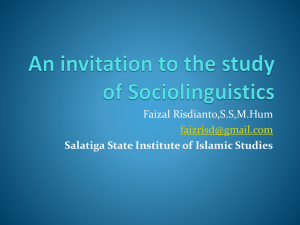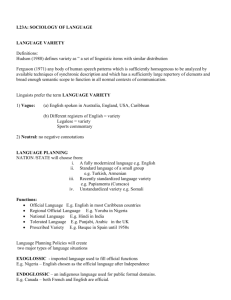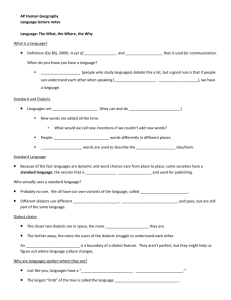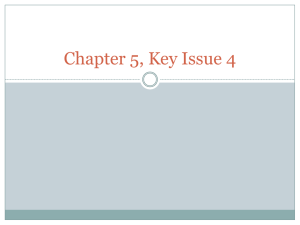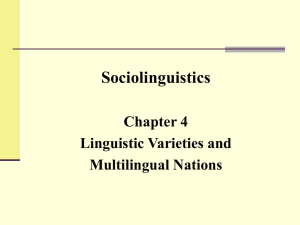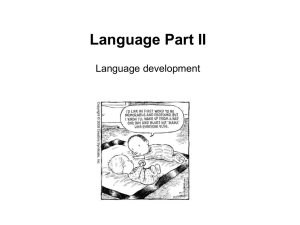Maritime Polynesian Pidgin: Philological
advertisement
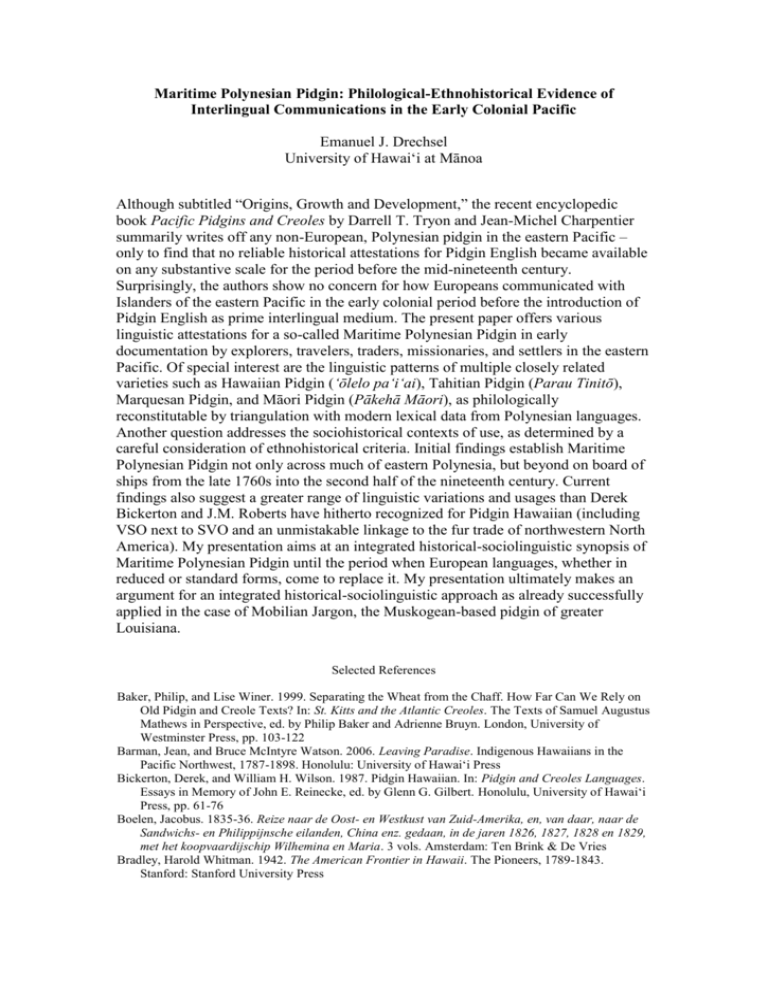
Maritime Polynesian Pidgin: Philological-Ethnohistorical Evidence of Interlingual Communications in the Early Colonial Pacific Emanuel J. Drechsel University of Hawai‘i at Mānoa Although subtitled “Origins, Growth and Development,” the recent encyclopedic book Pacific Pidgins and Creoles by Darrell T. Tryon and Jean-Michel Charpentier summarily writes off any non-European, Polynesian pidgin in the eastern Pacific – only to find that no reliable historical attestations for Pidgin English became available on any substantive scale for the period before the mid-nineteenth century. Surprisingly, the authors show no concern for how Europeans communicated with Islanders of the eastern Pacific in the early colonial period before the introduction of Pidgin English as prime interlingual medium. The present paper offers various linguistic attestations for a so-called Maritime Polynesian Pidgin in early documentation by explorers, travelers, traders, missionaries, and settlers in the eastern Pacific. Of special interest are the linguistic patterns of multiple closely related varieties such as Hawaiian Pidgin (‘ōlelo pa‘i‘ai), Tahitian Pidgin (Parau Tinitō), Marquesan Pidgin, and Māori Pidgin (Pākehā Māori), as philologically reconstitutable by triangulation with modern lexical data from Polynesian languages. Another question addresses the sociohistorical contexts of use, as determined by a careful consideration of ethnohistorical criteria. Initial findings establish Maritime Polynesian Pidgin not only across much of eastern Polynesia, but beyond on board of ships from the late 1760s into the second half of the nineteenth century. Current findings also suggest a greater range of linguistic variations and usages than Derek Bickerton and J.M. Roberts have hitherto recognized for Pidgin Hawaiian (including VSO next to SVO and an unmistakable linkage to the fur trade of northwestern North America). My presentation aims at an integrated historical-sociolinguistic synopsis of Maritime Polynesian Pidgin until the period when European languages, whether in reduced or standard forms, come to replace it. My presentation ultimately makes an argument for an integrated historical-sociolinguistic approach as already successfully applied in the case of Mobilian Jargon, the Muskogean-based pidgin of greater Louisiana. Selected References Baker, Philip, and Lise Winer. 1999. Separating the Wheat from the Chaff. How Far Can We Rely on Old Pidgin and Creole Texts? In: St. Kitts and the Atlantic Creoles. The Texts of Samuel Augustus Mathews in Perspective, ed. by Philip Baker and Adrienne Bruyn. London, University of Westminster Press, pp. 103-122 Barman, Jean, and Bruce McIntyre Watson. 2006. Leaving Paradise. Indigenous Hawaiians in the Pacific Northwest, 1787-1898. Honolulu: University of Hawai‘i Press Bickerton, Derek, and William H. Wilson. 1987. Pidgin Hawaiian. In: Pidgin and Creoles Languages. Essays in Memory of John E. Reinecke, ed. by Glenn G. Gilbert. Honolulu, University of Hawai‘i Press, pp. 61-76 Boelen, Jacobus. 1835-36. Reize naar de Oost- en Westkust van Zuid-Amerika, en, van daar, naar de Sandwichs- en Philippijnsche eilanden, China enz. gedaan, in de jaren 1826, 1827, 1828 en 1829, met het koopvaardijschip Wilhemina en Maria. 3 vols. Amsterdam: Ten Brink & De Vries Bradley, Harold Whitman. 1942. The American Frontier in Hawaii. The Pioneers, 1789-1843. Stanford: Stanford University Press Chamisso, Adelbert von. 1856a [1835]. Werke, ed. by Julius Eduard Hitzig. Vol. 1: Reise um die Welt mit der Romanzoffischen Entdeckungs-Expedition in den Jahren 1815-18 auf der Brigg Rurik, Kapitän Otto v. Kotzebue. Part I: Tagebuch. Fourth edition. Berlin: Weidmannsche Buchhandlung ___. 1856b [1835]. Werke, ed. by Julius Eduard Hitzig. Vol. 2: Reise um die Welt mit der Romanzoffischen Entdeckungs-Expedition in den Jahren 1815-18 auf der Brigg Rurik, Kapitän Otto v. Kotzebue. Part II: Anhang, Bemerkungen und Ansichten. Fourth edition. Berlin: Weidmannsche Buchhandlung ___. 1986. A Voyage Around the World with the Romanzov Exploring Expedition in the Years 18151818 in the Brig Rurik, Captain Otto von Kotzebue. Translated and edited by Henry Kratz. Honolulu: University of Hawai‘i Press Chappell, David A. 1997. Double Ghosts. Oceanian Voyagers on Euroamerican Ships. Armonk, NY: M.E. Sharpe Clark, Ross. 1977. In Search of Beach-la-Mar: Historical Relations Among Pacific Pidgins and Creoles. Working Papers in Anthropology, Archaeology, Linguistics, Maori Studies, Department of Anthropology, University of Auckland, Vol. 48 ___. 1990. Pidgin English and Pidgin Maori in New Zealand. In: New Zealand Ways of Speaking English, ed. by Allan Bell and Janet Holms. (Multilingual Matters 65.) Clevedon, England: Multilingual Matters, pp. 97-114 Colnett, James. 1940 [1789-1791]. The Journal of Captain James Colnett Aboard the Argonaut from April 26, 1789 to Nov. 3, 1791. Ed. with an Introduction and Notes by F.W. Howay. Toronto: The Champlain Society Dana, Jr., Richard Henry. 1911 [1840]. Two Years Before the Mast. A Personal Narrative. With a Supplement by the Author and Introduction and Additional Chapter by His Son. Boston: Houghton Mifflin Co. Day, Richard R. 1987. Early Pidginization in Hawaii. In: Pidgin and Creole Languages. Essays in Memory of John E. Reinecke, ed. by Glenn G. Gilbert. Honolulu: University of Hawai‘i Press, pp. 163-176 Dordillon, René Ildefonse. 1931-32. Grammaire et dictionnaire de la langue des îles Marquises. (Travaux et mémoires de l’institut d’éthnologie 17-18.) Paris: Institut d’éthnologie Drechsel, Emanuel J. 1996. An Integrated Vocabulary of Mobilian Jargon, a Native American Pidgin of the Mississippi Valley. Anthropological Linguistics 38: 248-354 ___. 1997. Mobilian Jargon. Linguistic and Sociohistorical Aspects of a Native American Pidgin. (Oxford Studies in Language Contact.) Oxford: Clarendon Press ___.1999. Language Contact in the Early Colonial Pacific: Evidence for a Maritime Polynesian Jargon or Pidgin. In: Creole Genesis, Attitudes and Discourse, ed. by John R. Rickford and Suzanne Romaine. Amsterdam: John Benjamins Publishing Company, pp. 71-96 ___. 2007a. Sociolinguistic-Ethnohistorical Observations on Maritime Polynesian Pidgin in Herman Melville’s Two Major Semi-Autobiographical Novels of the Pacific. Journal of Pidgin and Creole Languages 22: 231–261 ___. 2007b. Sociolinguistic-Ethnohistorical Observations on Pidgin English in Typee and Omoo. In: “Whole Oceans Away.” Melville and the Pacific, ed. by Jill Barnum, Wyn Kelley, and Christopher Sten. Kent, Ohio: Kent State University Press, pp. 49-62 Dumont d’Urville, J.S.C. 1834-35. Voyage pittoresque autour du monde. Resumé général des voyages de decouvertes. Two vols. Paris: L. Tenré and Henri Dupuy Goddard, Ives. 1973. Philological Approaches to the Study of North American Indian Languages: Documents and Documentation. In: Current Trends in Linguistics, Vol. 10: Linguistics in North America, ed. by Thomas A. Sebeok. The Hague: Mouton, pp. 727-745 Jarman, Robert. 1838. Journal of a Voyage to the South Seas, in the “Japan,” Employed in the Sperm Whale Fishery, Under the Command of Capt. John May. London: Longman and Co. and Charles Tilt Kuykendall, Ralph S. 1924. An Hawaiian in Mexico, 1789-1790. Thirty-Second Annual Report of the Hawaiian Historical Society for the Year 1923. Honolulu: Paradise of the Pacific Press, pp. 37-50 Melville, Herman. 1968a [1846]. Typee. A Peep at Polynesian Life. Ed. by Harrison Hayford, Hershel Parker, and G. Thomas Tanselle. Evanston and Chicago: Northwestern University Press and the Newberry Library ___. 1968b [1847]. Omoo. A Narrative of Adventures in the South Seas. Ed. by Harrison Hayford, Hershel Parker, and G. Thomas Tanselle. Evanston and Chicago: Northwestern University Press and the Newberry Library Mühlhäusler, Peter. 1997. Pidgin and Creole Linguistics. Expanded and revised edition. (Westminster Creolistics Series 3.) London: University of Westminster Press Nicholas, John Liddiard. 1817. Narrative of a Voyage to New Zealand, Performed in the Years 1814 and 1815; Performed in the Years 1814 and 1815, in Company with the Rev. Samuel Marsden, Principal Chaplain of New South Wales. Vol. 1 and 2. London: James Black and Son Pukui, Mary Kawena, and Samuel H. Elbert. 1986. Hawaiian Dictionary. Hawaiian-English, EnglishHawaiian. Revised and enlarged edition. Honolulu: University of Hawai‘i Press Radiguet, Max. 1929 [1860]. Les derniers sauvages. La vie et les moeurs aux îles Marquises (18421859). (Collection laque orange, aventures et voyages.) Paris: Éditions Duchartre & Van Buggenhoudt Roberts, J.M. 1995a. Pidgin Hawaiian: A Sociohistorical Study. Journal of Pidgin and Creole Languages 10: 1-56 ___. 1995b. A Structural Sketch of Pidgin Hawaiian. Amsterdam Creole Studies 12: 97-126 Rudnyćkyi, J.B. 1994. Jurij Lysjanśkyj’s Hawaiin Dictionary of 1804. (Ukrainian Studies Foundation in Australia 4.4, V.) Brisbane: Ukrainian Language Association Savage, John. 1807. Some Account of New Zealand; Particularly the Bay of Islands and Surrounding Country; With a Description of the Religion and Government, Language, Arts, Manufactures, Manners, and Customs of the Natives, &c. &c. London: J. Murray Schütz, Albert J. 1994. The Voices of Eden. A History of Hawaiian Language Studies. Honolulu: University of Hawai‘i Press Spoehr, Alexander. 1986. Fur Traders in Hawai‘i: The Hudson’s Bay Company in Honolulu, 18291861. Hawaiian Journal of History 20: 27-66 Tryon, Darrell T., and Jean-Michel Charpentier. 2004. Pacific Pidgins and Creoles. Origins, Growth and Development. (Trends in Linguistics, Studies and Monographs 132.) Berlin: Mouton de Gruyter Wahlroos, Sven. 2002. English-Tahitian Tahitian-English Dictionary/Fa‘atoro Parau Marite/PeritaneTahiti Tahiti-Marite/Peretane. Honolulu: Mā‘ohi Heritage Press Williams, Herbert W. 1971. Dictionary of the Maori Language. Seventh edition, revised and augmented by the Advisory Committee on the Teaching of the Maori Language, Department of Education. Wellington: GP Publications
